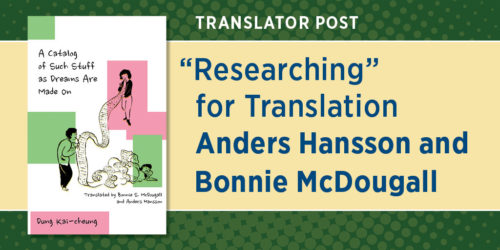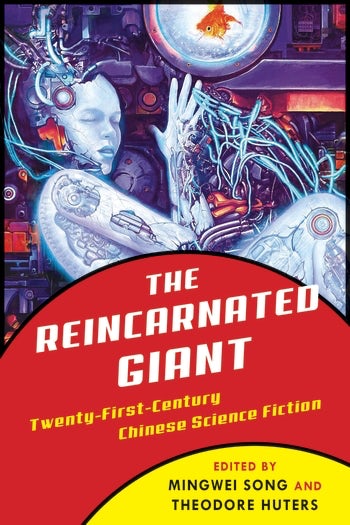Atlas by Dung Kai-cheung wins Science Fiction & Fantasy Translation Award
“It is the task of literature to make visible the invisible.”—Dung Kai-cheung
We don’t publish a lot of science fiction, so we hope you will indulge us in our excitement in announcing the news of Atlas: The Archaeology of an Imaginary City, by Dung Kai-cheung (translated from the Chinese by Anders Hansson, Bonnie S. McDougall, and the author), winning the Science Fiction and Fantasy Translation Award.
In praising the book jurist Alexis Brooks wrote, “Dung Kai-cheung’s amazingly yearning creation of short chapters toys with conceptions of place and being, with feeling and mythmaking, centered in the fictional story of one of the most painfully politicized cities still in existence in the world.”
While Kathryn Morrow, co-chair of the competition, praised the translation: “A masterwork on the nature of translation itself. The prose is beautifully rendered into English, and the author’s essential subject is the process by which myth, legend, and fact translate themselves into human cultural artifacts.”
For more on the book here is an excerpt from the book’s preface:
There are enough fictitious Hong Kongs circulating around the world. It doesn’t matter so much how real or false these fictions are but how they are made up. The Hong Kong of Tai-Pan and Suzie Wong, a mixture of economic adventures, political intrigues, sexual encounters, and romances; the Hong Kong of Bruce Lee, Jackie Chan, and Jet Li kung fu fighting their way through to the international scene; the Hong Kong of John Woo’s gangster heroes shooting doublehanded and Stephen Chow’s underdog antiheroes making nonsensical jokes. And yet, in spite of these eye-catching exposures, Hong Kong remains invisible. A large part of the reality of life here is unrepresented, unrevealed, and ignored. Hong Kong’s martial arts fiction, commercial movies, and pop songs are successful in East Asia and even farther abroad, but for all the talents, insights, and creativity of its writers, Hong Kong literature attracts minimal attention—not just internationally but even in mainland China. I am not claiming that literature represents a Hong Kong more real than the movies, but it has its unique role and methods and thus yields different meanings. It is not just a different way of world-representing but also a different way of world-building, that is, creating conditions for understanding, molding, preserving, and changing the world that we live in.
It is the task of literature to make visible the invisible. (Or, as is sometimes said, to articulate the unarticulated.) Curiously, in contrast to visual art forms like film, literature has a special capacity for rendering visibility. Words are nonvisual signs and many steps removed from the actual and the visible. By virtue of this removal, however, words invoke an imaginative power that is not bound by a photographic image. Telling and writing play on the dialectic between the visible and invisible, and that is the true meaning of “making visible.” This making is no less than the work of an artisan, in whose hands a world of objects is made and an abode of dwelling is built. What is more, it is not an abode of bricks and tiles but an abode of meanings.




